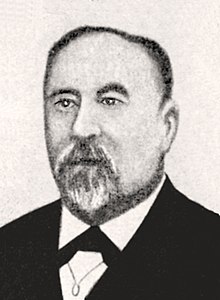| Jonas Smalakys | |
|---|---|
 Jonas Smalakys Jonas Smalakys | |
| Born | (1835-06-07)7 June 1835 Gross Trumpeiten, Kingdom of Prussia (today Shanino, Slavsky District, Kaliningrad Oblast, Russia) |
| Died | 8 May 1901(1901-05-08) (aged 65) Tilsit, German Empire (today Sovetsk, Kaliningrad Oblast, Russia) |
| Nationality | Prussian Lithuanian |
| Occupation(s) | Politician, soldier |
Jonas Smalakys (1835–1901) was a Prussian Lithuanian landowner, soldier, and the first Prussian Lithuanian to be elected to the Reichstag.
Early life
Smalakys was born into a wealthy landowning family in Prussia (Lithuania Minor), and in the 1850s used his inheritance to fund his travels across Europe, through the Balkans, and into Asia and Egypt. In 1859, he fought in the Second Italian War of Independence under Giuseppe Garibaldi. In 1862, he returned to Prussia and owned a manor in Gross Aglawischken. He sold the manor in 1894 and moved to Tilsit where he worked in trade.
Before selling his manor, Smalakys organized a gathering of Lithuanian and Prussian Lithuanian activists during the Saint Jonas' Festival in 1894. It included Vincas Kudirka and book smugglers. In 1895, he joined the board of the cultural Birutė Society and was its librarian. In 1898, he was one of the founders and board members of the Writing and Reading Society.
Political career
In 1890, together with Martynas Jankus and Dovas Zaunius, Smalakys established the Lithuanian Conservative Election Society (Lithuanian: Lietuviška konservatyvų skyrimo draugystė), which was the first of several such societies. Sometimes described as the first Lithuanian political party, its goal was to elect Prussian Lithuanians to the Reichstag and the Landtag of Prussia and to defend the use of the Lithuanian language, particularly when it came to the religious education in schools. Smalakys was a candidate to the Landtag in 1893 and 1898, but was not elected.
1898 elections
In the Reichstag election of June 1898, Smalakys was elected in the Memel–Heydekrug (Klaipėda–Šilutė) district. In the first round, he received only 23% of the vote, but an alliance with the liberals allowed him to gather 55% in the run-off and defeat his conservative opponent Generaloberst Graf Alfred von Waldersee. Two other Prussian Lithuanians, Dovas Zaunius and Mikelis Juška, as well as pro-Lithuanian linguist Georg Sauerwein unsuccessfully ran in the election. Jonas Basanavičius visited them from the Principality of Bulgaria and helped them with the campaign.
| Candidate | Votes received | |
|---|---|---|
| First round | Second round | |
| Alfred von Waldersee (German Conservative Party) | 5,557 | 6,456 |
| Jonas Smalakys | 3,504 | 7,818 |
| Heinrich Ancker (Free-minded People's Party) | 3,226 | |
| Otto Braun (Social Democratic Party) | 3,015 | |
| Total | 15,302 | 14,274 |
In the Reichstag, Smalakys listed himself as a Lithuanian and defended the rights of Prussian Lithuanians. However, politically, he was conservative and supported the German Empire. In a March 1899 speech to the Reichstag, he offered "every coin and the last drop of blood" for the benefit of the German Imperial Army. After his death in May 1901, a by-election was held in July and another Prussian Lithuanian Friedrich Martin Mattschull [de], a member of the German Conservative Party, was elected in his place.
Notes
- The village was known as Groß Trumpeiten in German and Didieji Trumpaičiai in Lithuanian. It was renamed to Trumpenau in 1938 (Russian: Трумпайтен) and to Shanino (Russian: Шанино) in 1946. It was located just south of Kaukehmen (present-day Jasnoje [de]).
- The village, located near Smalakys' birthplace, was known as Didieji Algaviškiai in Lithuanian.
References
- ^ Žemaitaitis, Algirdas (2009). "Smalakys, Jonas". Mažosios Lietuvos enciklopedija (in Lithuanian). Vol. 4. Vilnius: Mokslo ir enciklopedijų leidybos institutas. p. 284. ISBN 978-5-420-01470-7.
- Aleknavičius, Bernardas (23 June 2004). "Ištikimas Kudirkos bendražygis". XXI amžius (in Lithuanian). 47 (1250). ISSN 2029-1299.
- Kundrotas, Marius (2013-01-04). "Edmundo Berko konservatizmas ir šiuolaikiniai lietuviškieji konservatoriai (I)" (in Lithuanian). Alkas.lt. Retrieved 4 July 2017.
- Pocytė, Silva (2009). "Martyno Jankaus ir Prūsų lietuvių tautinės kultūrinės veiklos atspindys "Varpo" puslapiuose (1889-1905)". Knygotyra (in Lithuanian). 52: 80. ISSN 0204-2061.
- Thaler, Peter (2009). Of Mind and Matter: The Duality of National Identity in the German-Danish Borderlands. Purdue University Press. p. 154. ISBN 978-1-55753-524-5.
- "Socialist Gaining Ground". Washington Times. June 26, 1898. p. 3.
- Waldersee, Alfred Graf von (1923). Denkwürdigkeiten des General-Feldmarschalls Alfred Grafen von Waldersee: 1888-1900. p. 416.
- Masalskis, Hans (2003). Das Sprachgenie: Georg Sauerwein - eine Biographie (in German). Igel Verlag. p. 296. ISBN 9783896211576.
- Senn, Alfred Erich (1980). Jonas Basanavičius, the Patriarch of the Lithuanian National Renaissance. Newtonville, Mass.: Oriental Research Partners. p. 19. ISBN 0-89250-251-7.
- Stenographische Berichte über die Verhandlungen des Reichstages. 10 Legislaturperiode – Session 1898/1900 (in German). Vol. 174. Berlin: Julius Sittenfeld. 1899. p. 2411.
- ^ Specht, Friedrich W. C.; Schwabe, Paul (1904). Die Reichstags-Wahlen von 1867-1903. Berlin: Carl Hehmann. p. 1. OCLC 670365377.
- Pocytė, Silva (2011). "Mažosios ir Didžiosios Lietuvos integracijos problema XIX a. - XX a. pradžioje" (PDF). Sociologija. Mintis Ir Veiksmas. (in Lithuanian). 1–2: 86, 88. ISSN 1392-3358.